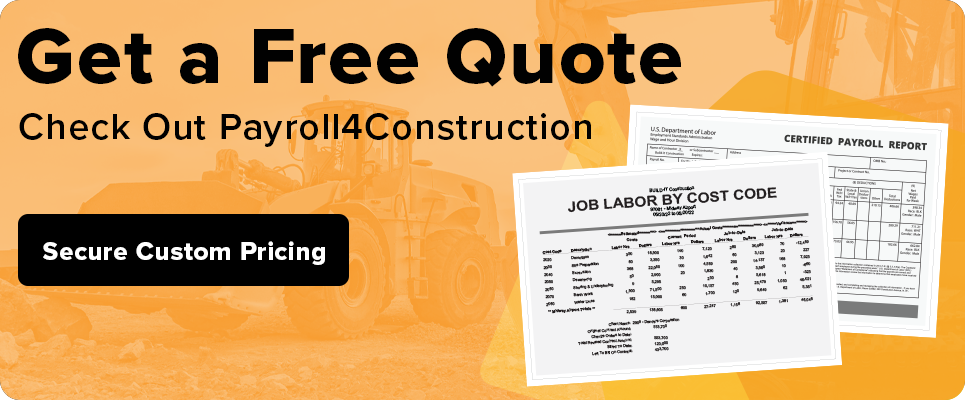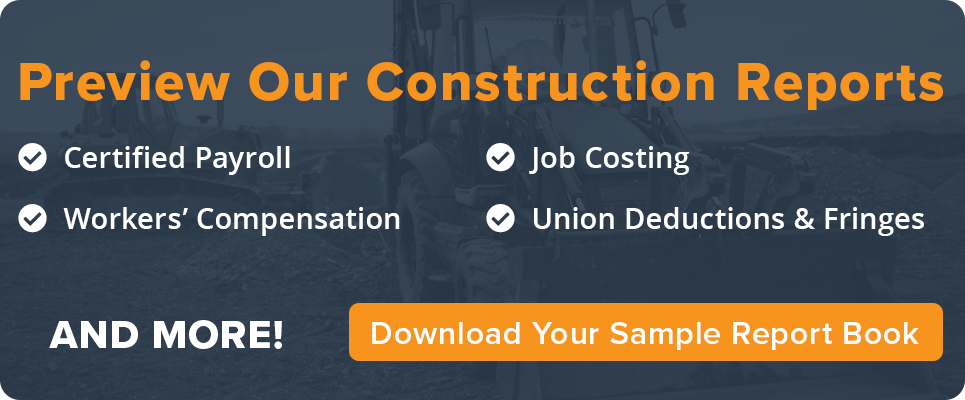How Construction Payroll Services Streamline Workers’ Compensation Management

November 6, 2024
In the construction industry, the safety of your workforce is vital.
Given the inherent risks associated with construction work, workers’ compensation insurance is not just a legal requirement — but a vital safety net for employees and employers.
According to Business Insurance, the construction sector reported three times the number of workers’ compensation claims in 2023 compared to other industries.
However, managing workers’ compensation in the construction industry, especially when combined with the complexities of payroll, can become a challenge for many construction companies.
If you’re a contractor, understanding these challenges and how a construction-specific payroll service can streamline workers’ compensation management can significantly impact your operations.
Key takeaways for better managing workers’ compensation benefits in your construction payroll:
- Ensure accurate employee classification based on the work being done to avoid overpaying for coverage.
- Automate your reporting to reduce errors and ensure timely compliance with state regulations.
- Use real-time data to track trends and address safety issues proactively.
- Simplify workers’ comp management with payroll services to streamline audits and compliance with multi-state regulations.
What is Workers’ Compensation in the Construction Industry?
Workers’ compensation insurance is designed to provide financial assistance to employees who suffer injuries or illnesses as a direct result of their work.
This coverage generally includes medical costs, rehabilitation costs, and a portion of lost wages for injured workers unable to perform their duties due to a work-related injury.
For construction companies, this insurance is especially crucial given the higher-than-average risks in the industry.
Workers’ compensation coverage is considered mandatory in nearly every state, and each state has its own set of government guidelines, making safety compliance a complex issue for multi-state contractors.
Links to individual state boards can be found on the National Council on Compensation Insurance (NCCI) website.
What Makes Workers’ Compensation Challenging in Construction?
The construction industry has unique challenges when it comes to managing workers’ comp coverage, including fluctuating labor costs, high employee turnover, and the variety of roles and risks involved.
Job Classification and Payroll Variability
Construction workers are often paid based on different factors, such as the type of job or location of work.
Workers’ compensation premiums are calculated based on job classifications and trade classifications.
Any mistakes in classifying workers can result in overpaying or underpaying premiums, which can be costly.
Multi-State Compliance
For contractors working across state lines, keeping up with different workers’ compensation regulations can be a nightmare.
Each state has rules on what qualifies as a reportable injury, what documentation is required, and how premiums are calculated.
Staying compliant with multiple jurisdictions is both time-consuming and error-prone.
Frequent Audits
Workers’ compensation insurance is often audited to ensure that the right premiums have been paid based on accurate employee classification, payroll, and job duties.
These audits can be difficult and disruptive if your records are not in order.
Rising Insurance Costs
Workers’ compensation insurance premiums are based on the total payroll and the risk level of the tasks being performed.
Given the high-risk nature of construction, premiums tend to be higher than in other industries, and managing these workers’ compensation costs efficiently is essential for maintaining profitability.
Injury Reporting and Claims Management
Injuries are a reality in construction. Timely and accurate reporting of workplace accidents is critical to ensuring that workers’ comp claims are processed efficiently.
Mismanagement of job-related injury reports or claims can lead to costly delays, increased premiums, and even potential lawsuits.
How Can a Construction-Specific Payroll Service Simplify Workers’ Compensation Management?
Given the complexity of workers’ compensation management, construction companies need a streamlined solution that avoids errors and reduces administrative burdens.
This is where a construction-specific payroll service becomes invaluable. Here’s how a payroll service built for the construction industry can help contractors better manage their workers’ compensation.
Accurate Job Costing and Classification
One of the biggest challenges in workers’ compensation is ensuring that employees are correctly classified based on the work performed.
Construction payroll services offer tools that help categorize employees by job type and location, ensuring that your payroll is always accurate and that workers’ comp premiums are based on precise data.
Automated Calculations
Construction payroll services can also streamline the process of paying workers’ compensation premiums.
Many services offer automated payment options, allowing companies to directly add the employee’s compensation to their paycheck and remit the entire amount to the insurance carrier.
This eliminates the need for manual data entry and reduces the risk of errors, further simplifying workers’ compensation management.
This reduces the likelihood of overpaying for coverage and ensures compliance with audit standards.
Instant Workers’ Comp Reporting
Contractors can automate workers’ compensation reporting, simplifying what can be a time-consuming and error-prone process.
Automated reports can be generated based on actual payroll data to avoid manually tracking employee classifications, hours worked, and job locations for reporting purposes.
This not only saves time but also reduces the chances of costly mistakes.
Streamlined Multi-State Compliance
If your construction business operates across state lines, the payroll service can handle the complexities of multi-state workers’ compensation regulations.
The service is designed to navigate the nuances of different state workers’ compensation laws, ensuring that your company remains compliant no matter where your job sites are located.
Real-Time Access to Data
A payroll service provides real-time reporting tools that allow contractors to access workers’ comp data whenever needed.
This helps in identifying trends, such as increased employee injury rates on specific construction job sites or under certain conditions, allowing you to take proactive steps to enhance workplace safety and control insurance costs.
Simplified Workers’ Compensation Audits
Because the payroll service is designed specifically for the construction industry, it maintains detailed records that make it easier to prepare for and pass workers’ compensation audits.
By having all your data centralized and easily accessible, you can minimize disruptions during the audit process and avoid penalties for inaccuracies.
Cost Control
Managing workers’ compensation effectively can reduce insurance premiums over time.
By ensuring accurate job classifications and payroll data, as well as improving injury reporting when there are injured employees, outsourcing construction payroll can help you better control these costs.
Additionally, by providing tools to help identify safety trends, contractors can reduce the frequency and severity of workplace injuries, further lowering workers’ comp premiums.
See How Payroll4Construction Can Simplify Workers’ Compensation Management
Managing workers’ compensation in the construction industry doesn’t have to be a headache.
By understanding the challenges and leveraging a construction-specific payroll service like Payroll4Construction, contractors can simplify compliance, improve injury prevention, reduce administrative burdens, and control costs.
Using Payroll4Construction, contractors can focus on what they do best while leaving the complexities of payroll and workers’ compensation reporting to the experts.
Chat with a specialist today to see more!
Share Article
Keep on current news in the construction industry. Subscribe to free eNews!


